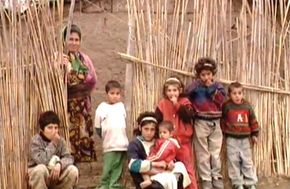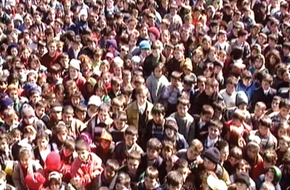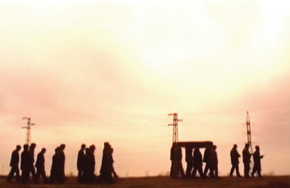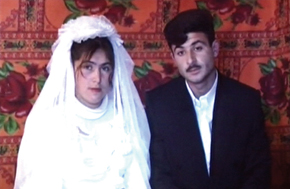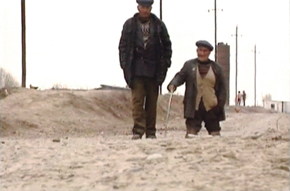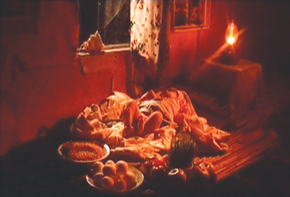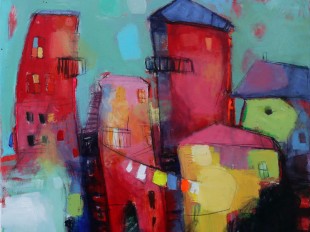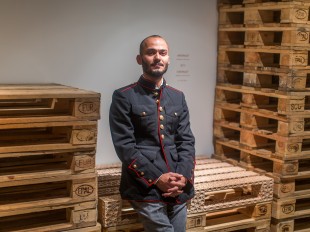The Ibrus theatre has shown two documentary films about child refugees from Karabakh
 Pages 68-71
Pages 68-71
by Natavan Faig gizi
The world through a child´s eyes. It is perhaps more beautiful than we adults see it, but far more terrible too in its separate, monstrous scenes. This was how I felt from the first shots of the work by two young film-makers, script writer Rafik Gashimov and director Elchin Musa oglu, devoted to a burning topic in Azerbaijan - refugee children, to the children of war, its victims. The film was made for the Ministry of Culture and Tourism. Actually, there were two films - The Sun and the Clouds and Dreams of a City of Rushes - they seemed like one film, as they had a unity of theme and perspective.
From the first minute the viewer is held hostage to inhuman "values" where pain and tears are more natural than laughter and joy. This abnormality is tripled when you realize that it applies to children, a child´s soul.
The first film, The Sun and the Clouds, begins in the morning in a tent camp. A morning without hope. Dawn. It is silent and harshly light. Like fear. Like the cry of a dumb man. The dawn is vague and slippery, like slush. The eternal slush under our feet. The dawn is as vague as the destiny that has cut open the course of life with a biting whip, destroying the dream forever. Forever? Probably, yes, because dreams have to come true on time. They have only one life. And unfortunately, it passes.
But now - now dawn is shattered by the cry of a newborn. Or the absurd, cheerful crow of a cockerel. Unlike the newborn he is satisfied with everything here. After all, this is what a cock is supposed to do, announce the arrival of the new day. But who wants this new day where there is nothing new? Where Today is just like Yesterday, and Tomorrow like Today. The inappropriate rejoicing of our feathered friend only aggravated the morose gloom around.
Sad realities - clay floors, an unbearably wretched life. But it is unbearable for us, they have got used to it and do not grumble. Here there are births, marriages, deaths - life goes on. A hateful life. Slow, like the chapter of the Koran read by the mullah that can be heard coming from the street, like a leitmotif of this existence, and the slow film penetrated by grief. Beyond the mullah are a few relatives seeing someone off to the next world. Life is life, and in life there is not only birth.
Slushy, sadly. As though hope had died
The film is narrated by a 12-year-old boy - one of the many children of his age who live in the tents. As they say, from the mouths of babes, or to be more exact, from their eyes. The tent is small, dark. In winter it is cold and in summer hot. An entire generation has grown up here - without their native land, the small native land that they know about only from the nostalgic stories of their parents, or to be more exact, of those who managed to escape.
However, they know for sure that it was very good there.
"Refugee" - there is no more offensive word for them. They are ashamed of it, ashamed of themselves. Maybe, because they are too constrained in this world, living somewhere on its edge. As though someone maliciously overlooked them. In a world where the clouds are grey and everyone is indifferent."
My biggest dream is not to be called a ´refugee´. It is very shameful to be a refugee. They come and make films, but if it was up to me, I would forbid all this filming," the film´s hero says. You cannot help but understand. Who can enjoy being an object of pity when they are young? Better to be an object of joy - after all they are teenagers. But that´s a long way off. Here they are refugees. Without age or dreams.
This eternal clay under the feet. Slippery as this slippery world. Unpredictable and fraught. No-one doubts it here.
At the heart of the script - put together from fragments of documents, memoirs, photos of war children - is their school compositions. Yes, the compositions given by literature teacher – Ulker khanum. Scriptwriter Rafig Gashimov said these essays made a strong impression on him: "Reading them I realised that these kids think like old people. The title of the first film was taken from a girl´s school essay, while the title of the second is a line from a poem by Gunel Movlud, who herself was born in a tent camp."
The film is penetrated with the desire to protect the children´s souls from this black misfortune.
The simple sorrow of the film, without a director´s spirit or aim to shock.
The film was shot live, without gloss or pathos. And how do you put a gloss on pain? A wound that bleeds endlessly. Existence here is such that just a single shot of it, even with an impartial camera, creates a shocking effect. What else is absent from this film - exaggeration and sentimentality - as there is no desire to shoot sensational froth. However, there is a desire of another kind - to shoot life. As it is, that is, if it is possible to call what was shown to us life.
And still there is no sense of a dead-end here - the children´ faces caught by the lens were too light. Though not only the children´s - maybe, that is it, an optimistic attitude to life, to the world, peculiar to the national character on which historical wounds (whether this is fortunate for us or not is a matter for discussion) do not leave a deep trace.
Or is this the stupefaction of resignation?
One way or another, they have had the sense not to get bogged down in the disorder of daily life. I did not see a sign of housing problems and hopelessness on the faces of people fatally tired from the struggle for life, I did not see suppressed and exhausted people. There is no despair or rage here.
The baby on the carpet gurgling and kicking his legs, still unaware of where he is. The green Samani shoots on the window-sill at Novruz. The young face of the bride in a mirror, rather upset with the sounds of Vaghzali. The "music school" - a dilapidated hovel where the diligent "one and, two and …" can be heard. The tiny accordion player, hardly visible behind his huge instrument, sweating all over as he understands the importance of the musical moment, counting the beat so assiduously as if there is nothing more important for him today. A feast during the plague and even the scanty supper of just a glass of yogurt does not feel oppressive - simply the child at the table is enjoying it, not hurrying to start "the meal", and has such a cheerful, cheeky look and wide-open eyes.
Everywhere, disheartening tidiness and cleanliness. It is even cosy. That is why you believe the lad, the hero of the film, when he says later: "Yes, the city is beautiful. But strange and cold, and more often you would rather be there in the tent. They are our people, they look after you."
One of most powerful shots shows prayer or namaz. Prayer during a thunder storm! The raging sky seems about to sweep away the fragile dwelling and does not heed the prayers. There are electricity problems in the tent camp and the old man prays in the darkness, occasionally broken with blinding lightning through the small window.
Sacrament or mysticism - take your pick - they take place in our life. I was convinced of it once again: it had to happen that during the old man´s scene the film theatre´s electricity was cut off. There was a power cut in the entire area, fortunately for us, not for long.
Then on the screen everything was as before. Lightning broke the gloom.
The artless story of the film, without any attempts at deliberate entertainment. A record of the era, merciless in its everyday reality.
Here are the terrible figures for the period covered by the film, figures marked by callousness and the impossibility of changing anything.
"In 10 years 46,944 children have been born here and 19,296 people have died."
We could not count forty per cent of our compatriots and they will not be our compatriots any more. As they say, without comment.
Towards the end of the first film the boy left into the sunset.
The Sun and the Clouds could have travelled to far more film festivals, were it not for these figures. Director Elchin Musa oglu said, "Whenever we sent the film to a prestigious film forum, we received a positive response, an invitation with the one condition that we remove these terrible figures. But we did not accept it."
The film-makers appeared to be uncompromising, every time refusing tempting invitations - it was a question of principle that they were not going to renounce. As a result the film was shown only in Leipzig though the word "only" is hardly appropriate, as the Leipzig festival has for a long time been considered the holy of holies of documentary cinema.
Not long ago The Sun and the Clouds was shown in Poland, at Wroclaw University, after which the film-makers were invited to TFN TV which wanted to broadcast the film on their channel - there is huge interest in the Karabakh problem and first-hand information about it worldwide.
 Pages 68-71
Pages 68-71by Natavan Faig gizi
The world through a child´s eyes. It is perhaps more beautiful than we adults see it, but far more terrible too in its separate, monstrous scenes. This was how I felt from the first shots of the work by two young film-makers, script writer Rafik Gashimov and director Elchin Musa oglu, devoted to a burning topic in Azerbaijan - refugee children, to the children of war, its victims. The film was made for the Ministry of Culture and Tourism. Actually, there were two films - The Sun and the Clouds and Dreams of a City of Rushes - they seemed like one film, as they had a unity of theme and perspective.
From the first minute the viewer is held hostage to inhuman "values" where pain and tears are more natural than laughter and joy. This abnormality is tripled when you realize that it applies to children, a child´s soul.
The first film, The Sun and the Clouds, begins in the morning in a tent camp. A morning without hope. Dawn. It is silent and harshly light. Like fear. Like the cry of a dumb man. The dawn is vague and slippery, like slush. The eternal slush under our feet. The dawn is as vague as the destiny that has cut open the course of life with a biting whip, destroying the dream forever. Forever? Probably, yes, because dreams have to come true on time. They have only one life. And unfortunately, it passes.
But now - now dawn is shattered by the cry of a newborn. Or the absurd, cheerful crow of a cockerel. Unlike the newborn he is satisfied with everything here. After all, this is what a cock is supposed to do, announce the arrival of the new day. But who wants this new day where there is nothing new? Where Today is just like Yesterday, and Tomorrow like Today. The inappropriate rejoicing of our feathered friend only aggravated the morose gloom around.
Sad realities - clay floors, an unbearably wretched life. But it is unbearable for us, they have got used to it and do not grumble. Here there are births, marriages, deaths - life goes on. A hateful life. Slow, like the chapter of the Koran read by the mullah that can be heard coming from the street, like a leitmotif of this existence, and the slow film penetrated by grief. Beyond the mullah are a few relatives seeing someone off to the next world. Life is life, and in life there is not only birth.
Slushy, sadly. As though hope had died
The film is narrated by a 12-year-old boy - one of the many children of his age who live in the tents. As they say, from the mouths of babes, or to be more exact, from their eyes. The tent is small, dark. In winter it is cold and in summer hot. An entire generation has grown up here - without their native land, the small native land that they know about only from the nostalgic stories of their parents, or to be more exact, of those who managed to escape.
However, they know for sure that it was very good there.
"Refugee" - there is no more offensive word for them. They are ashamed of it, ashamed of themselves. Maybe, because they are too constrained in this world, living somewhere on its edge. As though someone maliciously overlooked them. In a world where the clouds are grey and everyone is indifferent."
My biggest dream is not to be called a ´refugee´. It is very shameful to be a refugee. They come and make films, but if it was up to me, I would forbid all this filming," the film´s hero says. You cannot help but understand. Who can enjoy being an object of pity when they are young? Better to be an object of joy - after all they are teenagers. But that´s a long way off. Here they are refugees. Without age or dreams.
This eternal clay under the feet. Slippery as this slippery world. Unpredictable and fraught. No-one doubts it here.
At the heart of the script - put together from fragments of documents, memoirs, photos of war children - is their school compositions. Yes, the compositions given by literature teacher – Ulker khanum. Scriptwriter Rafig Gashimov said these essays made a strong impression on him: "Reading them I realised that these kids think like old people. The title of the first film was taken from a girl´s school essay, while the title of the second is a line from a poem by Gunel Movlud, who herself was born in a tent camp."
The film is penetrated with the desire to protect the children´s souls from this black misfortune.
The simple sorrow of the film, without a director´s spirit or aim to shock.
The film was shot live, without gloss or pathos. And how do you put a gloss on pain? A wound that bleeds endlessly. Existence here is such that just a single shot of it, even with an impartial camera, creates a shocking effect. What else is absent from this film - exaggeration and sentimentality - as there is no desire to shoot sensational froth. However, there is a desire of another kind - to shoot life. As it is, that is, if it is possible to call what was shown to us life.
And still there is no sense of a dead-end here - the children´ faces caught by the lens were too light. Though not only the children´s - maybe, that is it, an optimistic attitude to life, to the world, peculiar to the national character on which historical wounds (whether this is fortunate for us or not is a matter for discussion) do not leave a deep trace.
Or is this the stupefaction of resignation?
One way or another, they have had the sense not to get bogged down in the disorder of daily life. I did not see a sign of housing problems and hopelessness on the faces of people fatally tired from the struggle for life, I did not see suppressed and exhausted people. There is no despair or rage here.
The baby on the carpet gurgling and kicking his legs, still unaware of where he is. The green Samani shoots on the window-sill at Novruz. The young face of the bride in a mirror, rather upset with the sounds of Vaghzali. The "music school" - a dilapidated hovel where the diligent "one and, two and …" can be heard. The tiny accordion player, hardly visible behind his huge instrument, sweating all over as he understands the importance of the musical moment, counting the beat so assiduously as if there is nothing more important for him today. A feast during the plague and even the scanty supper of just a glass of yogurt does not feel oppressive - simply the child at the table is enjoying it, not hurrying to start "the meal", and has such a cheerful, cheeky look and wide-open eyes.
Everywhere, disheartening tidiness and cleanliness. It is even cosy. That is why you believe the lad, the hero of the film, when he says later: "Yes, the city is beautiful. But strange and cold, and more often you would rather be there in the tent. They are our people, they look after you."
One of most powerful shots shows prayer or namaz. Prayer during a thunder storm! The raging sky seems about to sweep away the fragile dwelling and does not heed the prayers. There are electricity problems in the tent camp and the old man prays in the darkness, occasionally broken with blinding lightning through the small window.
Sacrament or mysticism - take your pick - they take place in our life. I was convinced of it once again: it had to happen that during the old man´s scene the film theatre´s electricity was cut off. There was a power cut in the entire area, fortunately for us, not for long.
Then on the screen everything was as before. Lightning broke the gloom.
The artless story of the film, without any attempts at deliberate entertainment. A record of the era, merciless in its everyday reality.
Here are the terrible figures for the period covered by the film, figures marked by callousness and the impossibility of changing anything.
"In 10 years 46,944 children have been born here and 19,296 people have died."
We could not count forty per cent of our compatriots and they will not be our compatriots any more. As they say, without comment.
Towards the end of the first film the boy left into the sunset.
The Sun and the Clouds could have travelled to far more film festivals, were it not for these figures. Director Elchin Musa oglu said, "Whenever we sent the film to a prestigious film forum, we received a positive response, an invitation with the one condition that we remove these terrible figures. But we did not accept it."
The film-makers appeared to be uncompromising, every time refusing tempting invitations - it was a question of principle that they were not going to renounce. As a result the film was shown only in Leipzig though the word "only" is hardly appropriate, as the Leipzig festival has for a long time been considered the holy of holies of documentary cinema.
Not long ago The Sun and the Clouds was shown in Poland, at Wroclaw University, after which the film-makers were invited to TFN TV which wanted to broadcast the film on their channel - there is huge interest in the Karabakh problem and first-hand information about it worldwide.
DREAMS OF A CITY OF RUSHES
The second film, Dreams of a City of Rushes, with scriptwriters Rafik Gashimov and Selim Babullah oglu and director Elchin Musa oglu, developed out of the first, with the same hero, Samed, a little older but with the same dark aesthetic.Eighteen-year old Samed now lives in Baku where he dreams of going to university. He has behind him the full pleasure of army life. This is an attempt to reveal the psychology of a young man who has come to the big city from the reservation where he was born and grew up. Someone whose soul is suddenly turned upside down in an hour and gets a completely new perspective. "Who am I?" he asks. And then his own bitter answer follows: "For some reason it seems more and more to me that nobody will ever understand me."
Here is the city, longed for and unclear. Alluring and at the same time inaccessible. It is easy to understand the lad´s confusion. It is an abyss dominated by the gods of Snickers-supermarket well-being, where the suffocating advertising and presentation of video clips hold the purpose and meaning of life. All this urban bustle with its incomprehensible priorities - Viennese balls, night clubs and the shadlig evi (wedding house) pandemic.
The film´s hero faces a difficult choice between the baffling daily bustle here in the city, and the life filled with Nothing there.
There where time has stopped and the hands of the clock still show 1988. Where people live by their own clocks.
A tragic contrast. And Snickers - there, at the bottom of the abyss they know about it - in one scene in the first film a child recalls how an "uncle", a foreign visitor, treated him to chocolate last year. He was an especially compassionate peacemaker, one of the regular wave of "peacemakers" who descend upon them from time to time. The artless confession of the child causes an involuntary shudder of the soul. The spontaneous drop of "love" after so much deprivation and suffering - can it warm the tormented soul of a child? Or would it have been better not to offer a treat...
And again the reflection: "Are we really children of one people?"
The question remained unanswered, like a prayer under the punishing sky.
Dreams of a City of Rushes - why rushes? Because, according to Samed, "rushes are the only thing that is here in abundance. It seems that there is nothing but rushes."
Music is used to good effect in the film, choral music by Elnara Dadashova, a pupil of Kara Karayev. Her music can be felt organically, or to be more exact, it is not felt. Dumbfounding, it chills the spine. A fierce sense of absolute loneliness.
This was expressed too in English poet W.H. Auden´s poem Refugee Blues which was quoted in the film:
Once we had a country and we thought it fair,
Look in the atlas and you´ll find it there:
We cannot go there now, my dear, we cannot go there now.
Some people are able to feel somebody else´s pain. They should be respected just for their existence. I don´t mean just the makers of these films. There were people in the audience whose sudden sobs could be heard. Well, but the world - "The world is always deaf, when it is a matter of justice," said Anatole France the century before last. And I agree with him sadly.
"We stayed in the small tent camp in Sabirabad District for a long time - filming took almost a year," the director says. "We had to become one of them, to get used to the same circumstances, absorb all the bitterness of an existence unknown to us. Our arrival there became another reference point for us, we could say a starting point - for life experience, for an understanding of the macrocosms and microcosms inside and outside us. We had to store up life experience. To be more exact, experience of the soul."
Man never lives life alone, independently, separately, but is always accompanied by other neighbouring lives, wills, intellects. These small creatures have to cope with the pain to which they were destined by adults who threw them into the abyss of grief. They know precisely that it is possible to be hurt even without hurting anybody or doing anything bad.
Children´s faces, with views and conclusions that are sometimes criminally un-childlike. And questions that you are not able to answer.
"Dunya nadir?" ("What is the world?") asks little Lala with that winning sincerity peculiar to children. And at once all that has remained unspoken becomes very clear. Namely, war has barbarously singed the edges of their souls, but we have the strength not to let their souls burn completely.
Sometimes their conclusions are discouragingly simple. One of them came up with a striking aphorism: "They say that man was created from clay, from the land. So if we have lost our land, we have lost ourselves."
It is difficult for them without their native places. The lad in the film could not drink from the river - he scooped his palms, brought the water to his lips, but could not drink - not that water …
The eye of a camera with its piercing light snatches details from the darkness - this special world which shows us the nuances of a poor life invisible to the ordinary world. The lingering shots and slightly longer than usual pauses are to fix the pictures in the viewer´s mind, so that they are remembered. This achieves attention, intriguing concentration.
Yes, the makers of these films, who showed exceptional psychological perception, knew for sure that tragedy needs to be recreated from fragments. Fragments that make up a monumental canvas. A canvas of blasphemous injustice.
It was very important to make a record and show it to everyone who has never heard about this drama, or knows about it only by hearsay from the falsified and deformed interpretation of our unscrupulous neighbours. If only there were more such film documents.
I haven´t mixed up my words: a documentary film is something rather different.
